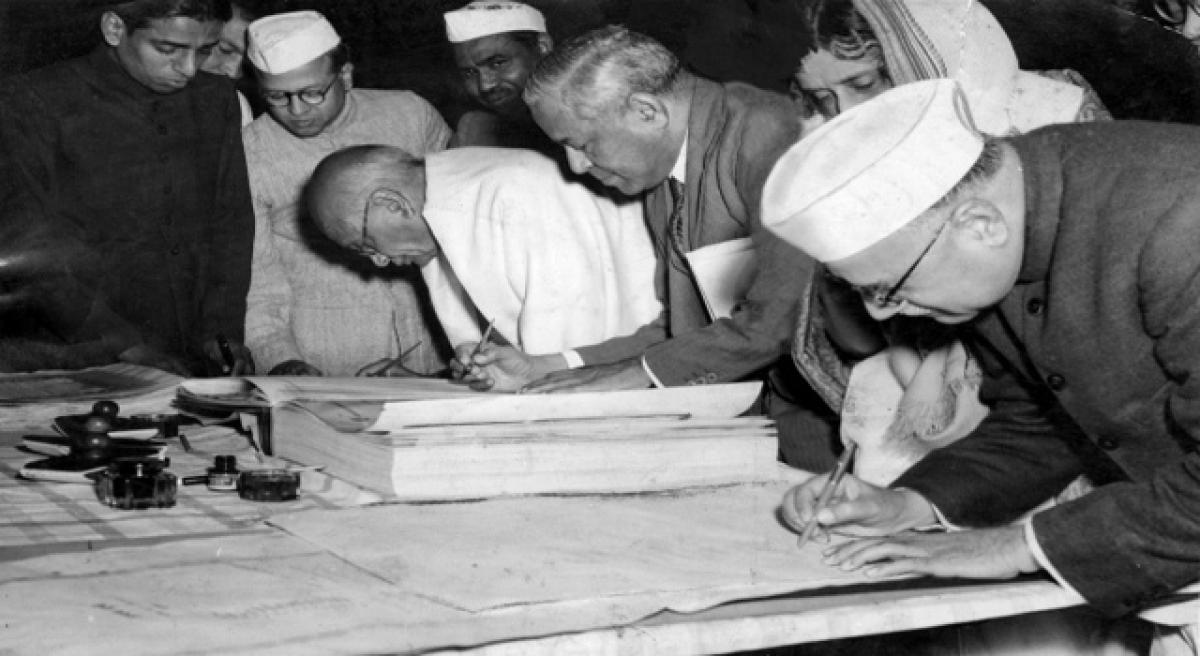Live
- Seven soldiers killed in attack on Pak military camp in Balochistan
- ICC announces 2025 Men’s Champions Trophy tour to begin in Islamabad
- Americans increasingly vote along class lines, not racial ones: Report
- Chandrababu's brother Rammurthy Naidu Passes Away in Hyderabad
- Russia restricts enriched uranium exports to US
- South African President orders immediate closure of tuck shops linked to food poisoning cases
- Study explains mechanisms behind food poisoning, gut infections
- Telangana residential school student commits suicide
- Cases of 'walking pneumonia' rise in US capital, joining national trend
- UN warns armed violence deepens humanitarian crisis in Sudan
Just In

Government of India has decided to observe 26th November as the \'Constitution Day. In 1949, the constitution was adopted which came into force on January 26, 1950 marking the beginning of a new era in the history of India.
Government of India has decided to observe 26th November as the 'Constitution Day. In 1949, the constitution was adopted which came into force on January 26, 1950 marking the beginning of a new era in the history of India.
This year, the country is celebrating 125th birth Anniversary of Dr B R Ambedkar. The'Constitution Day' will be a part of these year-long nationwide celebrations. This will be a tribute to Dr Ambedkar, who played a seminal role in the framing of the Indian Constitution as the Chairman of the Drafting Committee of Constituent Assembly
Ministry of Social Justice and Empowerment is the Nodal Ministry for celebration of Constitution Day. A number of activities will be taken up by other Ministries/Departments
Preamble
'We, the people of India, having solemnly resolved to constitute India into a sovereign, socialist, secular, democratic, republic and to secure to all its citizens:
- JUSTICE, social, economic and political
- LIBERTY of thought, expression, belief, faith and worship
- EQUALITY of status and opportunity, and to promote among all
- FRATERNITY assuring the dignity of the individual and the unity of the nation.
In our constituent assembly this 26/11/1949, do hereby adopt, enact and give to ourselves this constitution. The Preamble reflects the way of life adopted by Indian citizens for themselves after independence. In fact every civilisation has also been a mirror of way of life as well as reflecting movement of human spirit. Religion in each civilisation has indicated about the faith of human beings in absolute values and a way of life to realise them.
The Preamble to the Constitution of India signifies that India is a secular state. By the 42nd Constitutional Amendment Act of 1976, the term ‘Secular’ was incorporated in the Preamble. Its inclusion simply made the secular nature of the Indian Constitution more explicit.
As a state India gives special status to no religion. There is no such thing as a state religion of India. India guarantees equal freedom to all religions. All religions enjoy equality of status and respect.
Along with the word secular the word's ‘Socialism’ and 'Intergrity' were added. Socialism is now regarded as a prime feature of the State. It reflects the fact that India is committed to secure social, economic and political justice for all its people.
India stands for ending all forms of exploitation as well as for securing equitable distribution of income, resources and wealth. This has to be secured by peaceful, constitutional and democratic means. The term ‘India is a Socialist state’ really means, ‘India is a democratic socialist state.’
Preamble is a part of the constitution. In Berubari Case (1960), Supreme Court had held that Preamble is NOT a part of the constitution but later in Kesavanada Bharati Case (1973), the supreme Court gave an elaborate verdict which inter alia said that Preamble is Part of Constitution and is subject to the amending power of the parliament as any other provisions of the Constitution, provided the basic structure of the constitution is not destroyed.
OCI VS PIO
Merger of Overseas Citizen of India(OCI) and Persons of Indian Origin(PIO) schemes: Currently, the central government provides for two schemes for Indian origin persons, and their families, the Persons of Indian Origin card and the Overseas Citizen of India card.
Persons of Indian Origin enjoy fewer benefits than Overseas Citizens of India. For example, they are entitled to visa free entry into India for 15 years, while Overseas Citizens of India are provided a life-long visa.
Recently the government has decided to merge PIO into OCI and an amendment to the Citizenship Act, 1955 in this regard has been introduced in the parliament.
The Bill provides certain additional grounds for registering for an Overseas Citizen of India card.
These are:
(i)a minor child whose parent(s) are Indian citizens; or
(ii)spouse of foreign origin of an Indian citizen or spouse of foreign origin of an Overseas Citizen of India cardholder subject to certain conditions; or
(iii)great-grandchild of a person who is a citizen of another country, but who meets one of several conditions (for example, the great-grandparent must be a citizen of India at the time of commencement of the Constitution or any time afterwards).
An Overseas Citizen of India is entitled to some benefits such as a multiple-entry, multi-purpose life-long visa to visit India.
The Bill also introduces a new provision which allows the central government to register a person as an overseas citizen of India cardholder even if s/he does not satisfy any of the listed qualifications. This is permissible if special circumstances exist.
The Bill provides that the central government may notify that Persons of Indian Origin cardholders shall be considered to be Overseas Citizen of India cardholders from a specified date. I.e The Bill if enacted will be considered to have come into force on January 6, 2015.
By: Balalatha Mallavarapu

© 2024 Hyderabad Media House Limited/The Hans India. All rights reserved. Powered by hocalwire.com







